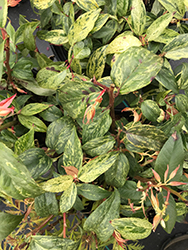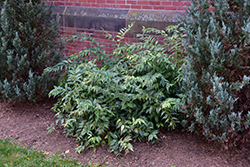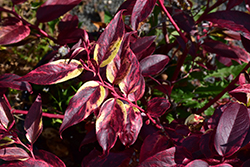Height: 5 feet
Spread: 6 feet
Sunlight:
![]()
![]()
Hardiness Zone: 5a
Other Names: Mountain Doghobble, Dog Hobble
Description:
Amazing green and cream splashed leaves tinted with burgundy; a compact shrub with pretty clusters of urn-shaped white flowers that compliment the interesting foliage; arching stems have a zigzag pattern; best in part-shade; water in extreme heat
Ornamental Features
Rainbow Fetterbush is blanketed in stunning racemes of white flowers along the branches in mid summer. It has attractive creamy white-spotted dark green foliage with hints of red. The glossy narrow leaves are highly ornamental and turn an outstanding burgundy in the fall, which persists throughout the winter.
Landscape Attributes
Rainbow Fetterbush is a multi-stemmed evergreen shrub with a shapely form and gracefully arching branches. Its average texture blends into the landscape, but can be balanced by one or two finer or coarser trees or shrubs for an effective composition.
This is a relatively low maintenance shrub, and is best pruned in late winter once the threat of extreme cold has passed. Deer don't particularly care for this plant and will usually leave it alone in favor of tastier treats. Gardeners should be aware of the following characteristic(s) that may warrant special consideration;
- Disease
Rainbow Fetterbush is recommended for the following landscape applications;
- Mass Planting
- Hedges/Screening
- Border Edging
- General Garden Use
- Naturalizing And Woodland Gardens
- Container Planting
Planting & Growing
Rainbow Fetterbush will grow to be about 5 feet tall at maturity, with a spread of 6 feet. It tends to fill out right to the ground and therefore doesn't necessarily require facer plants in front, and is suitable for planting under power lines. It grows at a medium rate, and under ideal conditions can be expected to live for approximately 20 years.
This shrub does best in partial shade to shade. It is quite adaptable, prefering to grow in average to wet conditions, and will even tolerate some standing water. It is particular about its soil conditions, with a strong preference for rich, acidic soils. It is somewhat tolerant of urban pollution, and will benefit from being planted in a relatively sheltered location. This is a selection of a native North American species.
Rainbow Fetterbush makes a fine choice for the outdoor landscape, but it is also well-suited for use in outdoor pots and containers. Because of its height, it is often used as a 'thriller' in the 'spiller-thriller-filler' container combination; plant it near the center of the pot, surrounded by smaller plants and those that spill over the edges. It is even sizeable enough that it can be grown alone in a suitable container. Note that when grown in a container, it may not perform exactly as indicated on the tag - this is to be expected. Also note that when growing plants in outdoor containers and baskets, they may require more frequent waterings than they would in the yard or garden.
Disclaimer - This resource is provided for informational purposes only and does NOT reflect current availability. Inventory varies seasonally, so we cannot guarantee that every plant will be in stock at all times - please contact your favourite GardenWorks location directly for current availability. It does not include our entire inventory of plants, so be sure to visit GardenWorks to see varieties that may not be represented on this list.



